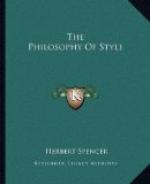23. The general principle of right arrangement in sentences, which we have traced in its application to the leading divisions of them, equally determines the proper order of their minor divisions. In every sentence of any complexity the complement to the subject contains several clauses, and that to the predicate several others; and these may be arranged in greater or less conformity to the law of easy apprehension. Of course with these, as with the larger members, the succession should be from the less specific to the more specific—from the abstract to the concrete.
24. Now, however, we must notice a further condition to be fulfilled in the proper construction of a sentence; but still a condition dictated by the same general principle with the other: the condition, namely, that the words and expressions most nearly related in thought shall be brought the closest together. Evidently the single words, the minor clauses, and the leading divisions of every proposition, severally qualify each other. The longer the time that elapses between the mention of any qualifying member and the member qualified, the longer must the mind be exerted in carrying forward the qualifying member ready for use. And the more numerous the qualifications to be simultaneously remembered and rightly applied, the greater will be the mental power expended, and the smaller the effect produced. Hence, other things equal, force will be gained by so arranging the members of a sentence that these suspensions shall at any moment be the fewest in number; and shall also be of the shortest duration. The following is an instance of defective combination:—“A modern newspaper-statement, though probably true, would be laughed at if quoted in a book as testimony; but the letter of a court gossip is thought good historical evidence, if written some centuries ago.” A rearrangement of this, in accordance with the principle indicated above, will be found to increase the effect. Thus:—“Though probably true, a modern newspaper-statement quoted in a book as testimony, would be laughed at; but the letter of a court gossip, if written some centuries ago, is thought good historical evidence.”




